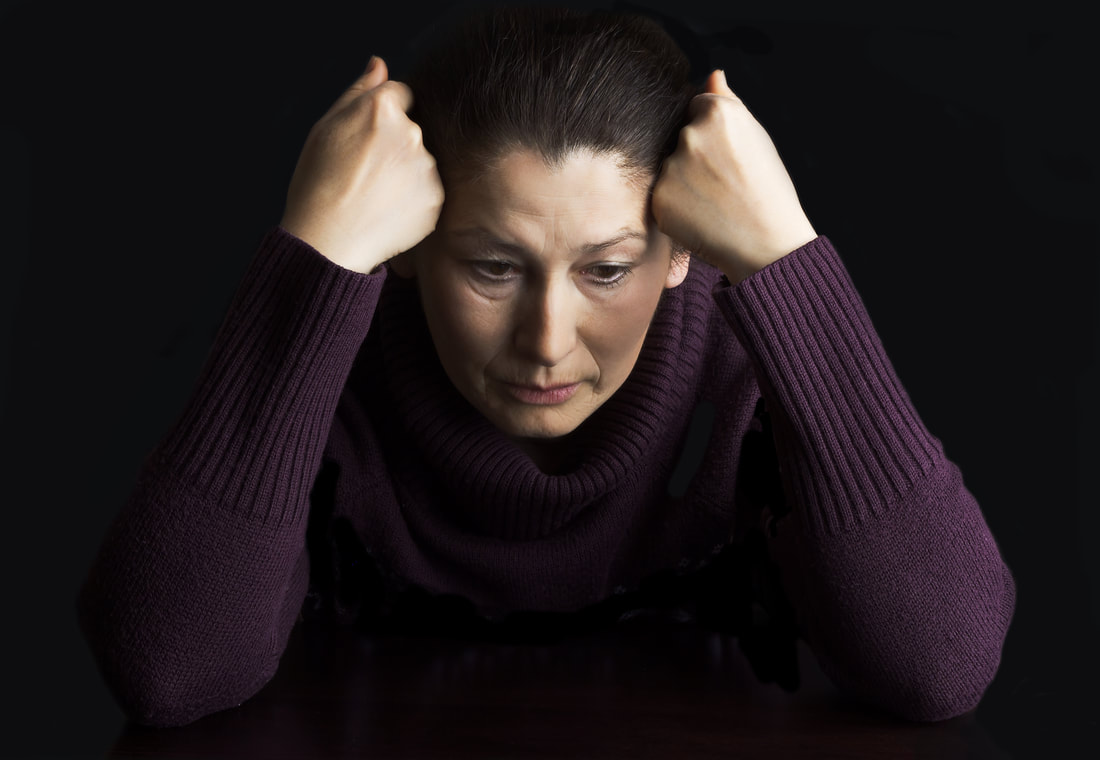|
It is typical for women to experience midlife depression. This can be a depressed mood which can be experienced as having a bad day or being in a blue-mood. Another can be feeling depression as the result of a life experience that is typical of many women in midlife such as the death of a parent, spouse or a close friend; an empty-nest, divorce or job-loss. The most serious is a clinical depression which happens as a result of a chemical imbalance in the brain which can be a hereditary condition. The hormonal shifts that occur in midlife can exacerbate each of these types of depression. Here are five things to do if you are experiencing midlife depression.
1. Think about why you might be feeling depressed and that will determine your course of action. Let’s start with feeling blue. This is the time to seek out a conversation with a good friend. It is also helpful to get some exercise as the increase in endorphins will elevate your mood. Engage in activities that you usually enjoy like listening to energizing music, do something creative or get out into nature where you can observe the beauty and enjoy the experience of being out in nature which is so healing for many of us. If your down mood persists, please consult your Dr. or a mental health professional. 2. When you have experienced a loss that is causing your depression, give yourself the gift of compassion. Any of the losses I described above can be devastating - take yourself seriously and be kind and gentle with yourself. Loss causes us to experience grief and the journey of grief is unpredictable and non-linear. You may benefit from seeking the support of a therapist or time with a spiritual support person. It is also important to make sure that you are eating well, getting good sleep, and exercising. For some people a short course of anti-depressant medication can be helpful. 3. If you feel that your midlife depression is actually a clinical depression it is important that you seek the advice of your doctor and additionally a mental health professional. How do you know? Some indications are that one can feel profound fatigue, a desire to sleep a lot or an inability to sleep, lack of ability to experience any joy or pleasure or the desire to seek out any, deep sadness, irritability and anger. Clinical depression is a serious condition and you deserve to get the attention to it that you need. It is, unfortunately, not unusual for women to want to both hide the experience of a clinical depression and to self-medicate a clinical depression with alcohol or other substances. Because our sexist and ageist culture is already hard on midlife women, the added pressure of a clinical depression can push a woman to her limits and self-harm can become a clear danger. Take this seriously and take care of yourself. 4. As I mentioned, the hormonal shifts of menopause can exacerbate any of these experiences of depression. Your hormones can naturally start to shift as early as your late thirties to your late forties and this perimenopausal phase can last several years. This phase can make you feel that you are “losing your mind”! Many women experience a whole host of other symptoms that can make you feel depressed because of the impact they can have on other areas of your life - work, family and social relationships. These symptoms often include feelings of irritability and even rage, lack of ability to focus and concentrate, memory lapses, loss of libido and many physical symptoms that can cause concern and sometimes fear. You may want to talk with your Dr. about whether or not hormone replacement therapy is right for you and what kind would be your best choice. If you would like to contact a menopause specialist you can find one in your area by visiting the section of the North American Menopause Society website that allows you to search for one in your area by using your zip code. Here is the link to that: https://portal.menopause.org/NAMS/NAMS/Directory/Menopause-Practitioner.aspx 5. The most important thing that you can do for yourself is to be informed. Step back and assess what you are feeling and why you think you might be experiencing it. Learn about the different types of a depressed mood as I have detailed above. Make a commitment take yourself seriously, take good care of yourself and seek the support that you need. There is no shame in experiencing depression - it is no different than any other physical disorder or injury. Your brain is part of your body! Regardless of the reasons that you are feeling depressed you deserve to get support and perhaps medical attention. You deserve to feel good! If you would like to reach out for more information about the experience of midlife depression please contact me. I am Dr. Barbara Mark, an executive, career development and life strategies coach for professional women in their 40s, 50s and 60s - the prime of life and the most dynamic decades of your professional life! If you would like some support in your career and/or your life please feel free to schedule a free consultation with me or sign up for my newsletter.
0 Comments
Leave a Reply. |
San Francisco Bay Area
|
Complimentary Exploratory Conversation
I invite you to contact me for a complimentary 60-minute conversation to explore the possibility of our working together. You can schedule that here. |
Copyright 2021: Barbara Mark, Ph.D. - A Time of My Own


 RSS Feed
RSS Feed